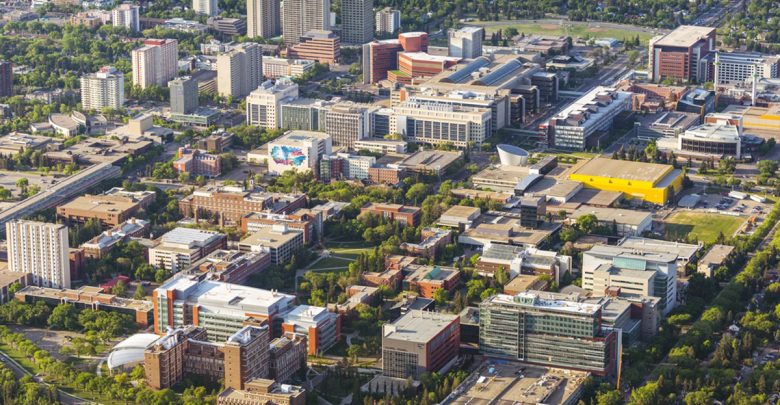 Supplied
SuppliedBack in February, the federal NDP adopted a free tuition policy at their convention in Ottawa.
The Canadian punditry was quick to respond. Alex Usher, President of Higher Education Strategy Associates, wrote a blog post critiquing 10 arguments made in favour of free tuition.
Meanwhile, then-Students’ Union President Marina Banister called the resolution “very ambitious,” suggesting that student advocacy should instead be focused on providing upfront needs-based grants.
Echoing these sentiments, economist Andrew Leach, a professor in the Alberta School of Business, tweeted “Did anyone try reframing this as ‘we should give a lot of money to rich people and a little bit of money to poor people?’”
Did anyone try reframing this as, "we should give a lot of money to rich people and a little bit of money to poor people?" https://t.co/QZfqNtyrjz
— Andrew Leach (@andrew_leach) February 18, 2018
Edmonton-based writer and community organizer Bashir Mohamed, a civil servant in Alberta’s Ministry of Education, argued instead that tuition should be free so post-secondary entry will be based purely on merit rather than on means. While targeted funding programs (for which Leach argues) may increase access for some low-income students, Mohamed argued that such stopgap measures can leave some people to fall through the cracks.
While Leach and Mohamed’s spat eventually died down, the question of free tuition still hangs in the air. It’s unclear whether it will make it onto the federal NDP’s 2019 election platform. After all, the party has been powerless to resist the pull of the moderate centre to entice the Canadian middle-class, normie-ass electorate.
Of course, Leach and Usher were right to say we shouldn’t give the rich a free pass. But these economic arguments fail to consider the political dimensions of tuition in our culture. I’d like to offer a further point which, as far as I’ve seen, hasn’t entered this battleground of tuition discourse.
Tuition should be free to emancipate students from their parents.
Writing in the Washington Post, college English and creative writing instructor Shannon Reed laments how students in her freshman classes are often unhappy with their majors. Their reason for choosing them? “My parents want me to.”
Since my areas of study — drama and philosophy — are popularly thought to be unemployable, I’m no stranger to this phenomenon. While thankfully my parents have supported my educational choices, several friends and acquaintances of mine have been caught between their own hopes and dreams and those of their parents.
Several of these friends — particularly the drama students — shied away from pursuing their desired program because their parents would only finance their education on the condition that they study a subject of their choosing.
For some friends, this means a compromise: a major in economics or the hard sciences with drama on the side. For others, this means completely forgoing their passions in favour of a “practical subject.”
Of course, my own evidence of this is purely anecdotal. Neither I nor Reed possesses Leach’s vast array of graphs and charts. How often do parents hold their children’s futures hostage to their own vicarious aspirations of professional success? I have no idea.
But the fact that this happens at all indicates a crack in post-secondary education’s political economy. For parents to exercise such far-reaching control over their legally grown-up offspring is unjust.
One’s undergrad years should be rich with exploration and self-discovery. As cliched as it sounds, undergrad provides young people a cushion between high school and “real life” where they can make personal and self-creating choices. Giving students appropriate autonomy in how they shape their presents and futures thus has profound moral importance.
Parents who choose a “practical” major for their otherwise-inclined children are missing the point of university. Undergraduate education isn’t merely about churning out productive workers who will earn high wages and take expensive family vacations. Rather, it’s an opportunity for students to bring some shape, flavour, and purpose to how they experience and operate in the world.
To take that away from one’s kids out of “practical” concerns is misguided at best, pernicious at worst. Making tuition free would eliminate this one weapon of power from the arsenal of the Parent-riarchy.
This injustice effects both rich and poor students alike (anyone’s parents can be shitty, it turns out), and thus is immune to Leach’s economic considerations. It also adds further weight to Mohamed’s call for universal post-secondary based on merit.
Now one might object, saying these students can still choose their own path, refusing their parent’s financial help and instead opting for student loans, work, and scholarships. No one’s forcing them to do what their parents want. And surely it’s reasonable for parents to place some conditions on how their own money is spent.
But this ignores the unique power parents have in the lives of their children until they reach adulthood. Negotiating the transition of power that comes with maturity — where kids must learn independence and parents must learn to let go — is hard enough. Putting fresh high school graduates in a position where they have to assert themselves against their parents only exacerbates this fraught situation. And the prohibitive cost of post-secondary education makes choosing one’s own major, and thus losing out on parental funding, an unduly nerve-wracking and unfair choice to make.
Tuition should be free so that students can be free: free from their economic circumstances, yes, but also free from the institutions that seek to structure their choices in alienating and self-serving ways — including the family.




